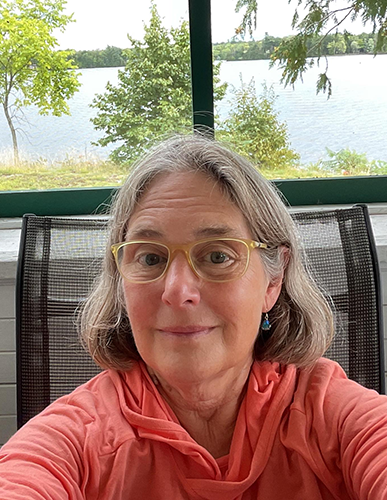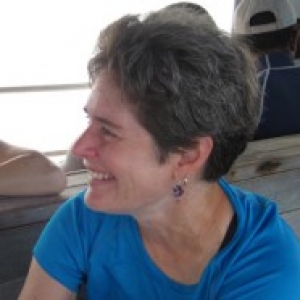Karen Brison, the Roger Thayer Stone Professor of Anthropology and department chair, grew up in Toronto, Canada, a culturally-diverse and accessible city. She spent many happy afternoons with her sister playing on the subway system, trying to find the most attractive stops and finding out how far you could go without paying an extra fare. In her high school in downtown Toronto, more than a third of the students were first-generation immigrants. These early adventures contributed to a love of exploration and an interest in cultural differences that eventually led to a Ph.D. in anthropology and to research in Papua New Guinea, Fiji, Micronesia and East Africa.
At Union, Brison teaches cultural anthropology, with a focus on psychological anthropology, language and culture, family and kinship, anthropology of childhood, and medical anthropology. She developed a term abroad in Fiji in 1997, which she has directed numerous times since then. The term places students in primary schools, where they study how culture and economy shape ideas about education. Students also live with local host families and learn about their kinship networks and religious life.
Brison is particularly proud of her most recent research project, which involved following missionaries from an independent Fijian Pentecostal church to Kenya, Tanzania, Uganda, Madagascar and several areas of Papua New Guinea.
“Popular culture often speaks of indigenous peoples and people in the Third World as if they were a homogenous group,” she said. “It was an eye-opening experience talking to people in different areas of the global south and hearing about what they thought about each other and how different their ideas were about common experiences like colonialism and economic precarity.”
Brison earned a degree in geography and anthropology at McGill University.
“I started out in geography because in Canada, you have to declare your major as soon as you begin,” she said. “But after awhile I decided that geography lacked a compelling intellectual core. So I also picked up a major in anthropology, which required a lot of the same cognate courses as geography. This was the only way that I could branch out but still finish my degree on schedule. I had never taken anthropology when I declared my major, but it sounded interesting in the catalogue description and luckily, I discovered that I really liked it.”
Brison earned MA and Ph.D. degrees in anthropology from the University of California, San Diego, and two postdoctoral fellowships from the University of Hawaii. She joined Union in 1993.
Her research is on Pacific Island societies, historically prominent in anthropology. She has studied village politics, oratory, gossip, religion, education and children’s acquisition of gender and ethnic identities. She has published four books on Papua New Guinea and Fiji: “Just Talk: Gossip, Meetings and Power in a Papua New Guinea Village,” “Our Wealth is Loving Each Other: Self and Society in Fiji,” “Children, Social Class and Education: Shifting Identities in Fiji,” and “Fijians in Transnational Pentecostal Networks.” She has also co-edited a book on youth culture, “Super Girls, Gangstas, Freeters and Xenomaniacs: Gender and Modernity in Global Youth Cultures”, and has published numerous articles.
She lives in Schenectady with her husband, Stephen Leavitt, professor of anthropology, and their cats, Sophie and Markl (named after characters in the film “Howl’s Moving Castle”), and their dog, Molly.
FIRST APP YOU LOOK AT IN THE MORNING:
Pokemon Go. I started playing this game about five years ago because I had fond memories of watching Pokemon cartoons with my son, Jeffrey. I look forward to playing as I drink my coffee. I still love those cute little creatures and the goals that can be satisfied with simple diligence and persistence!
GO-TO BREAKFAST:
A fruit and yogurt smoothie accompanied by two very big cups of strong coffee.
WHAT’S THE LAST GREAT BOOK YOU READ?
“The Spirit Ambulance: Choreographing the End of Life in Thailand” by Scott Stonington. I assign this book in Medical Anthropology. It explores end-of-life care in Thailand that seems to involve unnecessary pain and waste of medical resources and to overlook patient wishes. But Stonington, in true anthropological fashion, shows how this all makes sense to patients and their families in terms of Buddhist beliefs about the importance of accepting and transcending suffering and drawing earthly entanglements to a close so that the dying person can go in peace, and the family can accept the death.
BEST ADVICE YOU EVER RECEIVED:
You wouldn’t worry so much about what others think of you if only you realized how seldom they do. I have a vague memory of reading this in a book when I was a painfully shy teenager and finding it liberating. It is attributed to Eleanor Roosevelt, so I must have picked this up reading “Eleanor and Franklin,” which was passed around in my extended family.
FAVORITE PLACE TO VISIT:
I love going every summer to Bob’s Lake in eastern Ontario, where I spent all my childhood summers at my parents’ and grandparents' summer cottages. The lake is beautiful, and I always get to see my siblings, cousins and uncles and aunts there.
WHAT ARE YOU WATCHING RIGHT NOW?
“American Rust,” a mystery series about a well-meaning but somewhat corrupt police chief in rural Pennsylvania.
ONE SKILL YOU WISH YOU HAD:
I wish I could speak French. I studied French in school from third grade 3 until the end of high school under the old school method that focused on grammar and verb conjugations. By the end of high school, we were reading short novels in French, but I still struggle to speak even simple sentences.
THREE DINNER PARTY GUESTS (LIVING OR DECEASED):
Joan Baez and Paul McCartney because I’d like to hear how they have managed to age so exceptionally well, and then largely for the same reason, William Labov, one of the founding figures of American sociolinguistics. He is 97 and published a book last year.
FIRST CONCERT:
My family moved to downtown Toronto just after I turned eight (from Urbana, Ill. after a brief stint in the Toronto suburbs). My parents were really excited about all the things going on there. In the next year or two, we went to concerts by Harry Belafonte and Buffy Sainte-Marie and saw Odetta perform in a coffee house. We also started our annual tradition of going to see Gordon Lightfoot perform in Massey Hall in Toronto around that time because my brother went to junior kindergarten (pre-kindergarten for Americans) with Lightfoot’s son, Freddy. One of those concerts was my first.
LITTLE KNOWN FACT ABOUT YOU:
My family moved seven times before I was 10, and I went to five different schools between kindergarten and grade five. Because of this, I can accurately remember when most events in my childhood happened. This experience made me resilient and adaptable.

